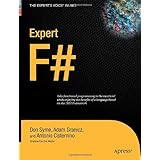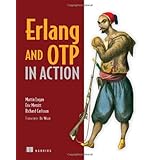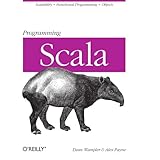
Average Reviews:

(More customer reviews)Are you looking to buy Expert F# (Expert's Voice in .NET)? Here is the right place to find the great deals. we can offer discounts of up to 90% on Expert F# (Expert's Voice in .NET). Check out the link below:
>> Click Here to See Compare Prices and Get the Best Offers
Expert F# (Expert's Voice in .NET) ReviewThe Good- Practical.
- High example density.
- Broad coverage of a lot of practical F# topics.
- Good depth on all the important practical stuff.
- I felt like I learned a lot, not only about F#, but about some cool C# features too.
- I felt like I'd be a lot more productive as a programmer if I could master the language.
The (not so) Bad
- Structurally, I initially got lost with some of the more complex examples. And it was straining to page back and forth re-reading things until I grasped the concepts. The density of information in the text sometimes makes it less valuable as a teaching aid and more valuable as a reference.
The (not so) Ugly
- I could not get one of the async examples to actually compile. I had to search the web for some hints to add declarations that seem to have been omitted from either the example code or F# implementation itself. In short, the example code, my development environment, F# itself, of some combination thereof was missing what appears to be an extension method for WebRequest.GetResponseAsync. I had to code it myself. But once I did, it worked! (This might not be a criticism of the book.)Expert F# (Expert's Voice in .NET) Overview
Expert F# is about practical programming in a beautiful language that puts the power and elegance of functional programming into the hands of .NET developers. In combination with .NET, F# achieves unrivaled levels of programmer productivity and program clarity. This books serves as
The authoritative guide to F# by the designer of F#
A comprehensive reference of F# concepts, syntax, and features
A treasury of expert F# techniques for practical, real–world programming
While inspired by OCaml, F# isn't just another functional programming language. Drawing on many of the strengths of both OCaml and .NET, it's a general–purpose language ideal for real–world development. F# integrates functional, imperative, and object–oriented programming styles so you can flexibly and elegantly solve programming problems, and brings .NET development alive with interactive execution. Whatever your background, you'll find that F# is easy to learn, fun to use, and extraordinarily powerful. F# will help change the way you think about and go about programming.
Written by F#'s designer and two active contributors, Expert F# is the authoritative, comprehensive, and in–depth guide to the language and its use. Designed to help others become experts, the book gives a thorough introduction to the F# language from quick essentials to in–depth advanced topics such as active pattern matching, aggregate data types and operators, sequence expressions, lazy values, mutable data and side–effects, generics, type augmentations, functional decomposition and code organization.
The second half of the book is devoted to examining the practical application of F#, providing elegant solutions to common programming tasks includinguser interfaceimplementation, data access, web and distributed programming, symbolic and numerical computations, concurrent programming, testing, profiling, and interoperability with other languages. The latest hot developments in F# and .NET are also addressed, including Active Patterns, implicit class construction, integration with LINQ over relational data, meta programming and useful tips for working with Visual Studio and F# command–line tools.
The worlds foremost experts in F# show you how to program in F# the way they do!
What you'll learn
How to use F# for functional, imperative, and object–oriented programming
How to code elegant F# solutions with expert technique and style
How to develop Windows, web, graphics, and database applications in F#
How to do numerical, concurrent, lexical, and symbolic processing in F#
How to interoperate with C and COM
Who this book is for
This book is for anyone interested in state–of–the art .NET programming. Professional programmers will find it engrossing. F# provides invaluable insight into the future of both C# and VB, which are now adopting some (but far from all) of the functional features of F#. Once they learn F#, few feel like returning to either C# or VB. The academic community will find F# the answer to a decades–long prayer: a language suitable for teaching computer science that also excites and empowers students because it can be used not just in the classroom, but also in the real world.
Want to learn more information about Expert F# (Expert's Voice in .NET)?
>> Click Here to See All Customer Reviews & Ratings Now



